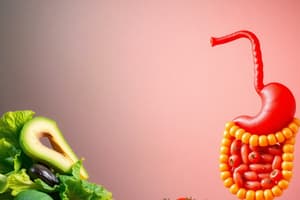Podcast
Questions and Answers
Where does the digestion of carbohydrates initially commence?
Where does the digestion of carbohydrates initially commence?
- Small intestine
- Esophagus
- Stomach
- Oral cavity (correct)
What is the primary enzyme responsible for carbohydrate digestion in saliva?
What is the primary enzyme responsible for carbohydrate digestion in saliva?
- Trypsin
- Pepsin
- Alpha amylase (correct)
- Lipase
Which of the following carbohydrates is NOT digestible by human gut enzymes?
Which of the following carbohydrates is NOT digestible by human gut enzymes?
- Cellulose (correct)
- Starch
- Sucrose
- Lactose
Which term is used to denote alpha amylase when it is found in saliva?
Which term is used to denote alpha amylase when it is found in saliva?
What is the most common form of carbohydrate ingested by humans?
What is the most common form of carbohydrate ingested by humans?
Which of the following best describes the initial stage of carbohydrate digestion?
Which of the following best describes the initial stage of carbohydrate digestion?
What type of molecule does alpha amylase primarily act upon?
What type of molecule does alpha amylase primarily act upon?
Which of these is a disaccharide that requires digestion?
Which of these is a disaccharide that requires digestion?
Which of the following carbohydrates will be primarily broken down before being absorbed?
Which of the following carbohydrates will be primarily broken down before being absorbed?
If a person lacks the enzymes to break down a specific type of carbohydrate, which of the following would be the most likely outcome?
If a person lacks the enzymes to break down a specific type of carbohydrate, which of the following would be the most likely outcome?
What is the primary function of peptidases within the enterocyte cytosol?
What is the primary function of peptidases within the enterocyte cytosol?
Where do peptidases within the enterocyte perform their hydrolytic function?
Where do peptidases within the enterocyte perform their hydrolytic function?
What molecules are the substrates for peptidases within the enterocyte cytosol?
What molecules are the substrates for peptidases within the enterocyte cytosol?
What are the direct products formed by the activity of peptidases in the enterocyte cytosol?
What are the direct products formed by the activity of peptidases in the enterocyte cytosol?
What is the state of di-and tri-peptides after hydrolysis by peptidases in the enterocyte?
What is the state of di-and tri-peptides after hydrolysis by peptidases in the enterocyte?
In which part of the digestive system is the absorption of nutrients greatest?
In which part of the digestive system is the absorption of nutrients greatest?
What types of molecules are transported via the co-transport system mentioned?
What types of molecules are transported via the co-transport system mentioned?
How does the rate of absorption change as you move caudally from the duodenum?
How does the rate of absorption change as you move caudally from the duodenum?
Which of the following statements about nutrient absorption is true?
Which of the following statements about nutrient absorption is true?
Which nutrients are primarily absorbed through co-transport systems in the duodenum?
Which nutrients are primarily absorbed through co-transport systems in the duodenum?
Which molecule binds to Fe++ to form a complex that is transported into the cell?
Which molecule binds to Fe++ to form a complex that is transported into the cell?
What mechanism is used for transporting the iron-ferritin complex into the cell?
What mechanism is used for transporting the iron-ferritin complex into the cell?
What is the primary function of the complex formed by iron and ferritin?
What is the primary function of the complex formed by iron and ferritin?
Which of the following statements is true regarding the role of ferritin?
Which of the following statements is true regarding the role of ferritin?
What type of iron does ferritin specifically bind to?
What type of iron does ferritin specifically bind to?
What effect does acidic pH have on iron absorption?
What effect does acidic pH have on iron absorption?
How does vitamin C contribute to iron absorption?
How does vitamin C contribute to iron absorption?
Which form of iron is more readily absorbed in the body?
Which form of iron is more readily absorbed in the body?
What is the primary role of vitamin C regarding iron levels?
What is the primary role of vitamin C regarding iron levels?
Which statement is true regarding the relationship between vitamin C and iron?
Which statement is true regarding the relationship between vitamin C and iron?
Flashcards
Hydrolysis
Hydrolysis
The process of breaking down molecules into smaller units.
Peptidases
Peptidases
Enzymes that break down peptides (chains of amino acids).
Cytosol
Cytosol
The fluid inside a cell.
Di- and Tri-peptides
Di- and Tri-peptides
Signup and view all the flashcards
Amino Acids
Amino Acids
Signup and view all the flashcards
Carbohydrate Digestion
Carbohydrate Digestion
Signup and view all the flashcards
Starch
Starch
Signup and view all the flashcards
Sucrose
Sucrose
Signup and view all the flashcards
Lactose
Lactose
Signup and view all the flashcards
Cellulose
Cellulose
Signup and view all the flashcards
Alpha amylase
Alpha amylase
Signup and view all the flashcards
Oral cavity
Oral cavity
Signup and view all the flashcards
Saliva
Saliva
Signup and view all the flashcards
Ptyalin
Ptyalin
Signup and view all the flashcards
Co-transport system
Co-transport system
Signup and view all the flashcards
Monosaccharides
Monosaccharides
Signup and view all the flashcards
Duodenum
Duodenum
Signup and view all the flashcards
Absorption
Absorption
Signup and view all the flashcards
pH
pH
Signup and view all the flashcards
Vitamin C
Vitamin C
Signup and view all the flashcards
Ferrous Iron
Ferrous Iron
Signup and view all the flashcards
Ferric Iron
Ferric Iron
Signup and view all the flashcards
Iron Absorption
Iron Absorption
Signup and view all the flashcards
Ferritin
Ferritin
Signup and view all the flashcards
Ferritin-Iron complex
Ferritin-Iron complex
Signup and view all the flashcards
Receptor-mediated endocytosis
Receptor-mediated endocytosis
Signup and view all the flashcards
Receptor
Receptor
Signup and view all the flashcards
Transport of Ferritin-Iron complex
Transport of Ferritin-Iron complex
Signup and view all the flashcards
Study Notes
Digestion and Absorption
- Digestion involves enzymes breaking down carbohydrates, proteins, and lipids.
- Absorption is performed by specialized epithelial cells.
- Most absorption occurs in the small intestine, with some in the stomach and none in the esophagus.
- The small intestine has a specialized structure to increase nutrient absorption.
- Mucosal folds triple the surface area.
- Villi increase the surface area tenfold.
- Microvilli increase the surface area twentyfold, resulting in a total of 600 folds.
Digestion and Absorption of Carbohydrates
- Carbohydrates are ingested primarily as starch, sucrose, lactose, and cellulose.
- Cellulose is not digested in the gut.
- Digestion begins in the mouth with salivary amylase (ptyalin).
- Salivary amylase breaks down starch into smaller glucose polymers.
- Pancreatic amylase further digests starch, breaking down 1-4 alpha glycosidic bonds, yielding maltose and maltotriose.
- Brush border enzymes (lactase, sucrase, maltase, and alpha-dextranase) completely hydrolyze disaccharides and glucose polymers into monosaccharides (glucose, fructose, and galactose) for absorption.
Digestion and Absorption of Proteins
- Protein digestion begins in the stomach with pepsin, aided by HCl.
- Pepsin breaks peptide bonds in proteins, producing polypeptides.
- Pancreatic proteolytic enzymes (endopeptidases and exopeptidases) further break down polypeptides into smaller peptides and amino acids.
- Brush border enzymes (peptidases) convert the smaller peptides into oligopeptides and amino acids.
- Di- and tripeptides are transported into the enterocyte by active transport.
Digestion and Absorption of Lipids
- Bile salts emulsify lipids into smaller droplets, increasing the surface area.
- Pancreatic lipase and co-lipase act on the water-oil interface of the triglycerides.
- This yields free fatty acids (FFAs), and monoglycerides.
- FFAs, monoglycerides, phospholipids, cholesterol, and bile salts form micelles.
- The micelles deliver lipids to the epithelial cells of the small intestine.
- The free fatty acids and monoglycerides are released into the enterocytes by passive diffusion.
- The reformed triglycerides combine with cholesterol and phospholipids to form chylomicrons.
- Short-chain fatty acids and glycerol pass directly into the blood capillaries.
Absorption of Water and Electrolytes
- Water is absorbed passively via osmosis, following the absorption of sodium (Na+).
- Sodium is actively transported out of the enterocytes.
- Electrolytes (like sodium) are absorbed actively in both the small intestine and colon.
Absorption of Vitamins
- Water-soluble vitamins are absorbed passively, with the exception of vitamin C, B1, and B12.
- Vitamin B12 requires intrinsic factor for absorption.
- Lipid-soluble vitamins (A, D, E, and K) are absorbed in the same way as lipids.
Absorption of Iron
- Iron is absorbed as ferrous (Fe++) ion.
- Acidic pH and vitamin C increase iron absorption.
- Phosphates, oxalates, phytic acid, and pancreatic juice inhibit iron absorption.
Other Important Points
- Absorption differs for various nutrients; for example, proteins and carbohydrates have enzymatic digestion in the small intestine, and lipids are emulsified and absorbed via micelles.
- Some nutrients require specific transporters or hormonal regulation for absorption.
Studying That Suits You
Use AI to generate personalized quizzes and flashcards to suit your learning preferences.




